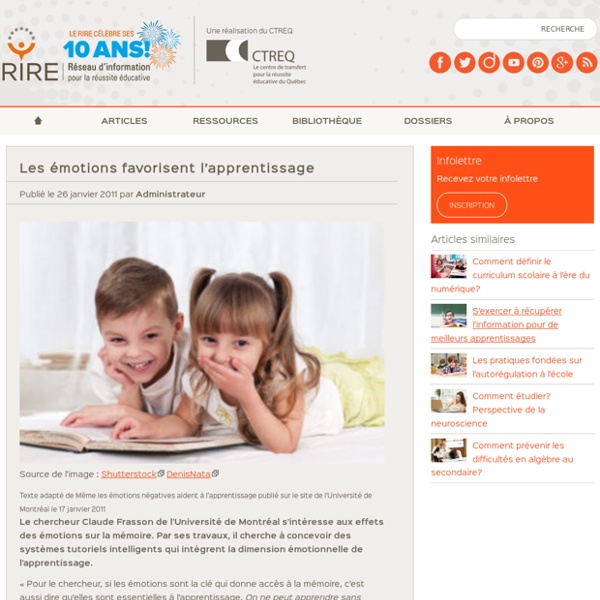



http://rire.ctreq.qc.ca/2011/01/les-emotions-favorisent-lapprentissage/
Related: Apprendre à apprendre - Métacogniton, méthodologie • émotion • Apprendre à apprendre Neurosciences21 Brilliant Productivity Tools Every College Student Must Use If you ask a college student about productivity, he won't have much to say. And you really can't blame him. He leads a dynamic life where academics and fun go hand in hand, with the latter becoming a more important activity most of the times. Working Memory by Saul McLeod published 2008, updated 2012 Atkinson’s and Shiffrin’s (1968) multi-store model was extremely successful in terms of the amount of research it generated. However, as a result of this research, it became apparent that there were a number of problems with their ideas concerning the characteristics of short-term memory. Building on this research, Baddeley and Hitch (1974) developed an alternative model of short-term memory which they called working memory (see fig 1). Baddeley and Hitch (1974) argue that the picture of short-term memory (STM) provided by the Multi-Store Model is far too simple.
Metagognition.com If you’re trying to use your Google Account and see a message saying your browser's cookie functionality is turned off, it’s likely your browser's cookies are disabled. You’ll need to turn cookies on to use your Google Account. Google Chrome On your browser toolbar, select More Settings. Near the bottom of the page, select Advanced. Under "Privacy and security," select Content settings. How to Learn on Your Own: Creating an Independent Scholar Resource Plan One of the most challenging and gratifying parts of learning alone is the opportunity to search for and select your own learning material. Students in traditional classrooms usually don’t get to decide how they are going to master course content. Instructors decide for them in the form of textbook selection, quizzes, tests, group projects, etc.
Entrance testing is not the answer University students need to learn to write for different disciplines and assignments, and testing the skills they learned in high school isn’t relevant to what they will need to learn. by Roger Graves and David Slomp We commend Nicholas Dion and Vicky Maldonado for calling for assessments of university students’ writing (“We need to assess student literacy skills”) in University Affairs. We agree with their argument that without these assessments, universities will face budget cuts and students have no way of proving their worth as writers. However, we disagree that entrance testing at the university level will contribute to solving this problem. In a series of conferences we’ve organized in Alberta over the last two years, we have talked with more than 100 high school teachers, university instructors and administrators about the transition from high school writing to university writing.
Self-University Week / AUTODIDACTIC PRESS - lifelong learning advocate Self-University Week September 1-7 Autodidactic Press has sponsored Self-University Week since 1989. It is our intention to continually expand this celebration until the value of lifelong learning is indelibly etched into the national consciousness. Chase's Annual Events lists the first seven days of September as Self-University Week. The purpose of Self-University Week is to remind adults (in or out of school) that each of us has a responsibility to help shape the future by pursuing lifelong education.
In praise of the squishy subjects - Capital Read, Inkless Wells Dear readers: This one’s long. You may want to settle in. About a year ago the Canada Millennium Scholarship Foundation approached me to contribute a paper in conjunction with a conference the group would host, called Opportunities-Excellence. They invited me to write about a topic that interested me having something to do with innovation and the knowledge economy. This would not be worth doing unless I did something unusual, I said to myself, so I offered to defend the poor orphan child of modern academe: the oversubscribed, unloved social sciences and humanities. Mostly because I’m sick of the way “return on investment,” a profoundly shaky notion at the best of times, has become the lens through which too much of our conversation about higher education and scholarship is examined.
Hacking Knowledge: 77 Ways to Learn Faster, Deeper, and Better If someone granted you one wish, what do you imagine you would want out of life that you haven’t gotten yet? For many people, it would be self-improvement and knowledge. Newcounter knowledge is the backbone of society’s progress. Great thinkers such as Leonardo da Vinci, Thomas Edison, Benjamin Franklin, Albert Einstein, and others’ quests for knowledge have led society to many of the marvels we enjoy today.